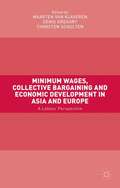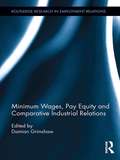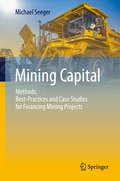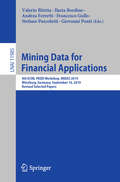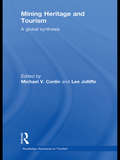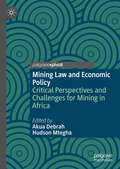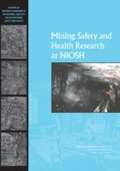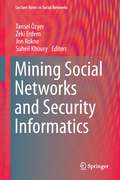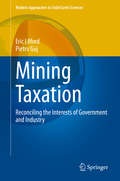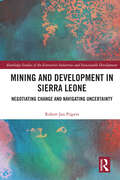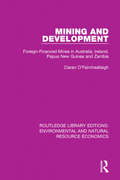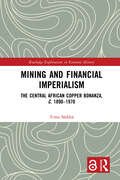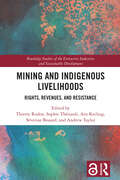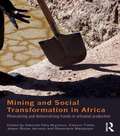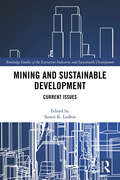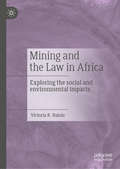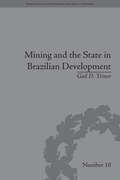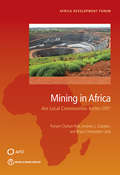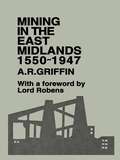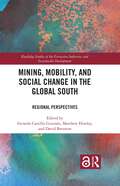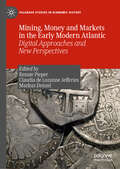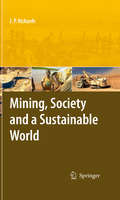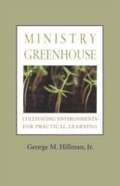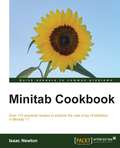- Table View
- List View
Minimum Wages, Collective Bargaining and Economic Development in Asia and Europe
by Maarten Van Klaveren Denis Gregory Thorsten SchultenMinimum Wages, Collective Bargaining and Economic Development in Asia and Europe offers a labour perspective on wage-setting institutions, collective bargaining and economic development. Sixteen country chapters, eight on Asia and eight on Europe, focus in particular on the role and effectiveness of minimum wages in the context of national trends in income inequality, economic development, and social security. Two chapters on Asia and Europe compare and contrast national experiences and discuss the relevance of a redistributive wages policy for worldwide as well as national economic recovery. Demand or wage-led economic recovery is explored as an alternative to the export-led strategies currently pursued by leading Asian and European countries. In light of the slow pace of recovery from recession in Europe, the renewed recession in Japan and the weakening growth rates of major Asian countries, this book provides a timely reconsideration of the macroeconomic policy options. As such, it contributes to the wider debate over sustainable economic growth and income inequality.
Minimum Wages, Pay Equity, and Comparative Industrial Relations (Routledge Research in Employment Relations #30)
by Damian GrimshawWith growing concern about the conditions facing low wage workers and new challenges to traditional forms of labor market protection, this book offers a timely analysis of the purpose and effectiveness of minimum wages in different European countries. Building on original industry case studies, the analysis goes beyond general debates about the relative merits of labor market regulation to reveal important national differences in the functioning of minimum wage systems and their integration within national models of industrial relations. There is no universal position on minimum wage policy followed by governments and social partners. Nor is it true that trade unions consistently support minimum wages and employers oppose them. The evidence in this book shows that interests and objectives change over time and differ across industries and countries. Investigating the pay bargaining strategies of unions and employers in cleaning, security, retail, and construction, this book’s industry case studies show how minimum wage policy interacts with collective bargaining to produce different types of pay equity effects. The analysis provides new findings of ‘ripple effects’ shaped by trade union strategies and identifies key components of an ‘egalitarian pay bargaining approach’ in social dialogue. The lessons for policy are to embrace an inter-disciplinary approach to minimum wage analysis, to be mindful of the interconnections with the changing national systems of industrial relations, and to interrogate the pay equity effects.
Mining Capital: Methods, Best-Practices and Case Studies for Financing Mining Projects
by Michael SeegerMining is a capital-intensive industry, and involves long lead times to develop projects that demand a structured approach, from mine exploration to exit. This book provides mine developers, investors, owners, shareholders, and mineral policymakers a comprehensive game plan to raise capital for the development of new mining projects or to bolster operational mines. The author, an experienced mining capital consultant, shows how mine developers and mine owners can secure capital in any phase of the commodity price cycle, at any site, and at any project stage. The book follows a proven and structured approach that enables mine developers and owners to successfully raise capital for their projects. With the aid of case studies and practical methods, the reader will learn the essentials on topics ranging from developing and marketing a business case for investment, to the types and sources of mining capital for different project stages, as well as the structure and significance of due diligence. The author presents actual mining projects and their funding plans, transaction structures and term sheets for capital. The mining projects discussed represent various project stages, commodities, and parts of the globe, offering a comprehensive reference guide for mine developers, investors and promoters alike.
Mining Data for Financial Applications: 4th ECML PKDD Workshop, MIDAS 2019, Würzburg, Germany, September 16, 2019, Revised Selected Papers (Lecture Notes in Computer Science #11985)
by Valerio Bitetta Ilaria Bordino Andrea Ferretti Francesco Gullo Stefano Pascolutti Giovanni PontiThis book constitutes revised selected papers from the 4th Workshop on Mining Data for Financial Applications, MIDAS 2019, held in conjunction with ECML PKDD 2019, in Würzburg, Germany, in September 2019. The 8 full and 3 short papers presented in this volume were carefully reviewed and selected from 16 submissions. They deal with challenges, potentialities, and applications of leveraging data-mining tasks regarding problems in the financial domain.
Mining Heritage and Tourism: A Global Synthesis (Routledge Advances in Tourism)
by Michael V. ConlinMany former mining areas have now lost their industrial function and are now turning to tourism for regional revitalization and community economic development. The transformation process of these industrial, and in some cases derelict, mining sites and landscapes into an area of interest for tourists is a major challenge both for planners and for tourism managers. It involves complex consideration to both the preservation of the physical site and community mining heritages as well as the health, safety and environmental factors inherent in opening these vast sites to the public. Mining Heritage and Tourism includes contributions from internationally recognized authorities and is the first book to focus on the issues, challenges and potentials in redeveloping mines as cultural heritage attractions which are explored thematically throughout the book. It draws on multidisciplinary research to consider the dichotomy between heritage preservation and tourist development goals for mining heritage sites as well as to explore the practical challenges of developing these sites. These themes are illustrated by case studies from a vast range of geographical locations around the globe to offer operational insights into the planning and management of these sites for both heritage and tourism purposes, as well as innovative site management techniques. There has never before been a more comprehensive book on mining heritage tourism representing the latest developments in strategy, policy and practices. This book serves as an invaluable guide for students, researchers, academics and practitioners in the areas of Tourism and Heritage Management.
Mining Law and Economic Policy: Critical Perspectives and Challenges for Mining in Africa
by Akua Debrah Hudson MteghaThis book explores the impacts of current mining licensing regimes in Africa and how they influence sustainable development principles. International law and conventions on mining are used as a lens to examine a regionalized perspective of the history of mining law and customary land law. Alternative approaches are then suggested, through a comparative and sovereignty-based study of mining laws and policies, to see how the challenge of uneven development can be combatted using minerals.This book aims to highlight how mineral possessions can transform communities if the economic policies, customary law structures, and the geopolitical landscape guarantee inclusivity and equal partnerships. It will be relevant to researchers and policymakers interested in mineral economics, mining law, and African economies.
Mining Safety and Health Research at NIOSH: Reviews of Research Programs of the National Institute for Occupational Safety and Health
by National Research Council Institute of Medicine of the National AcademiesThe U.S. mining sector has the highest fatality rate of any industry in the country. Fortunately, advances made over the past three decades in mining technology, equipment, processes, procedures, and workforce education and training have significantly improved safety and health. The National Institute for Occupational Safety and Health (NIOSH) Mining Safety and Health Research Program (Mining Program) has played a large role in these improvements. An assessment of the relevance and impact of NIOSH Mining Program research by a National Research Council committee reveals that the program makes essential contributions to the enhancement of health and safety in the mining industry. To further increase its effectiveness, the Mining Program should proactively identify workplace hazards and establish more challenging and innovative goals toward hazard reduction. The ability of the program to successfully expand its activities, however, depends on available funding.
Mining Social Networks and Security Informatics
by Zeki Erdem Jon Rokne Suheil Khoury Tansel ÖzyerCrime, terrorism and security are in the forefront of current societal concerns. This edited volume presents research based on social network techniques showing how data from crime and terror networks can be analyzed and how information can be extracted. The topics covered include crime data mining and visualization; organized crime detection; crime network visualization; computational criminology; aspects of terror network analyses and threat prediction including cyberterrorism and the related area of dark web; privacy issues in social networks; security informatics; graph algorithms for social networks; general aspects of social networks such as pattern and anomaly detection; community discovery; link analysis and spatio-temporal network mining. These topics will be of interest to researchers and practitioners in the general area of security informatics. The volume will also serve as a general reference for readers that would want to become familiar with current research in the fast growing field of cybersecurity.
Mining Taxation: Reconciling the Interests of Government and Industry (Modern Approaches in Solid Earth Sciences #18)
by Eric Lilford Pietro GujThis book examines existing mineral fiscal policies covering income taxation, royalties, free carried and participative (community and government) interests and also highlights the impacts of these policies on the feasibility of mineral projects as well as on revenue and other benefits to the State. While publications already exist on the subject matter, they have invariably approached the topic primarily from a Government standpoint rather than the mining industry. This book aims to provide a balance in this debate by comparing the financial outcomes gained or foregone by both Government and industry under different policy regimes. The discussions are supported by quantitative examples to more clearly articulate the potential outcomes and better inform future fiscal policy decisions.
Mining and Development in Sierra Leone: Negotiating Change and Navigating Uncertainty (Routledge Studies of the Extractive Industries and Sustainable Development)
by Robert Jan PijpersMining and Development in Sierra Leone examines how different actors in Sierra Leone use the effects of large-scale mining to navigate and transform the challenging conditions of life. The book offers an in-depth analysis of the processes of development and change that mark resource extraction environments globally. Across the world, resource extraction is assigned an important role in development agendas. Yet a key question is how development opportunities are given shape and accessed and how extraction’s negative impacts are dealt with in actual politics and practices. Set in the Northern Province of Sierra Leone during a global mining boom, this book shows how mining-cum-development’s multifaceted effects materialize. By taking the micro-politics of large-scale mining as its principal focus, the book analyzes a range of the most perplexing phenomena of life in Sierra Leone and scrutinizes the intricate and contentious processes of change unfolding in mining environments. Mining and Development in Sierra Leone goes beyond promise-or-problem dichotomies, offers key insights into the struggle for progress that characterizes the mining-development nexus, and provides innovative understandings of the resourceful ways in which different actors negotiate change and navigate uncertainty. This book will be of interest to students and scholars working on resource extraction, large-scale investments, globalization, and development, as well as to development practitioners, mining professionals, and policymakers.
Mining and Development: Foreign-Financed Mines in Australia, Ireland, Papua New Guinea and Zambia (Routledge Library Editions: Environmental and Natural Resource Economics)
by Ciaran O'FaircheallaighThis book, first published in 1984, examines the economics and political issues raised by foreign investment in mineral development. It is an attempt to identify, as far as possible, what occurs in and between countries when foreign investments are made in mineral development, concentrating on two main themes: on the nature of the transactions which constitute the process of foreign investment on the physical level – money and instruments of credit, objects, information and people as they cross national boundaries – and on the nature of the relationships which are created between foreign investors and governments in the countries where the investments are made. The author argues that the nature of physical transactions plays a crucial role in determining the character of host country-foreign investor relations, and the policies and attitudes adopted by host country authorities exercise an important influence, in turn, on the physical effects of foreign investments. As such, the book constitutes a comprehensive overview of the economic and political factors involved in mining and its development.
Mining and Financial Imperialism: The Central African Copper Bonanza, c. 1890–1970 (Routledge Explorations in Economic History)
by Timo SärkkäMining finance houses were substantial public corporations with access to money markets in the City of London, the world’s leading capital market for mining. These institutions became dominant at the inception of colonial rule and, in varying forms, remained so throughout the twentieth century.Drawing on a rich corpus of primary sources, this book analyses the Western colonial origins of the mining industry and its post-colonial legacies in the Central African Copperbelt. It provides insights into the operations of the global business of mining: in particular, how these processes took place, why they were considered desirable by various interest groups, and the impact that these processes continue to have on physical and human environments in parts of the world where they took place. It also turns its gaze to the City of London looking at who the financiers were and the nature of the power which they wielded. A long-term perspective on mining finance reveals that thus far the colonial governments have been the main focus in the history of imperialism in Central Africa, with little focus in many instances on the mining finance houses which have outlived them.The book is a significant contribution to the economic, financial and business history of mining and extractive industries, Central Africa, the City of London and early forms of financial capitalism.
Mining and Indigenous Livelihoods: Rights, Revenues, and Resistance (Routledge Studies of the Extractive Industries and Sustainable Development)
by Andrew Taylor Sophie Thériault Thierry Rodon Arn Keeling Séverine BouardThis book maps the encounters between Indigenous Peoples and local communities with mining companies in various postcolonial contexts.Combining comparative and multidisciplinary analysis, the contributors to this volume shine a light on how the mining industry might adapt its practices to the political and legal contexts where they operate. Understanding these processes and how communities respond to these encounters is critical to documenting where and how encounters with mining may benefit or negatively impact Indigenous Peoples. The experiences and reflections shared by Indigenous and non-Indigenous contributors will enhance our understanding of evolving practices and of the different strategies and discourses developed by Indigenous Peoples to deal with mining projects. By mobilizing in-depth fieldwork in five regions—Australia, Canada, Sweden, New Caledonia, and Brazil—this body of work highlights voices often marginalized in mining development studies, including those of Indigenous Peoples and women.This book will be of great interest to students and scholars of mining and the extractive industries, sustainable development, natural resource management, and Indigenous Peoples.The Open Access version of this book, available at http://www.taylorfrancis.com, has been made available under a Creative Commons Attribution-Non Commercial-No Derivatives (CC-BY-NC-ND) 4.0 license.
Mining and Social Transformation in Africa: Mineralizing and Democratizing Trends in Artisanal Production (Routledge Studies in Development and Society)
by Deborah Fahy Bryceson Eleanor Fisher Jesper Bosse Jønsson Rosemarie MwaipopoAfter more than three decades of economic malaise, many African countries are experiencing an upsurge in their economic fortunes linked to the booming international market for minerals. Spurred by the shrinking viability of peasant agriculture, rural dwellers have been engaged in a massive search for alternative livelihoods, one of the most lucrative being artisanal mining. While an expanding literature has documented the economic expansion of artisanal mining, this book is the first to probe its societal impact, demonstrating that artisanal mining has the potential to be far more democratic and emancipating than preceding modes. Delineating the paradoxes of artisanal miners working alongside the expansion of large-scale mining investment in Africa, Mining and Social Transformation in Africa concentrates on the Tanzanian experience. Written by authors with fresh research insights, focus is placed on how artisanal mining is configured in relation to local, regional and national mining investments and social class differentiation. The work lives and associated lifestyles of miners and residents of mining settlements are brought to the fore, asking where this historical interlude is taking them and their communities in the future. The question of value transfers out of the artisanal mining sector, value capture by elites and changing configurations of gender, age and class differentiation, all arise.
Mining and Sustainable Development: Current Issues (Routledge Studies of the Extractive Industries and Sustainable Development)
by Sumit. K. LodhiaMining is a transformative activity which has numerous economic, social and environmental impacts. These impacts can be both positive and adverse, enhancing as well as disrupting economies, ecosystems and communities. The extractive industries have been criticised heavily for their adverse impacts and involvement in significant social and environmental scandals. More recently, these industries have sought to respond to negative perceptions and have embraced the core principles of sustainability. This sector could be regarded as a leader in sustainability initiatives, evident from the various developments and frameworks in mining and sustainability that have emerged over time. This book reviews current topical issues in mining and sustainable development. It addresses the changing role of minerals in society, the social acceptance of mining, due diligence in the mining industry, critical and contemporary debates such as mining and indigenous peoples and transit worker accommodation, corporate sustainability matters such as sustainability reporting and taxation, and sustainability solutions through an emphasis on renewable energy and shared-used infrastructure. Written by experts from Australia, Europe and North America, but including examples from both developed and developing countries, the chapters provide a contemporary understanding of sustainability opportunities and challenges in the mining industry. The book will be of interest to practitioners, government and civil society as well as scholars and students with interests in mining and sustainable development.
Mining and the Law in Africa: Exploring the social and environmental impacts
by Victoria R. NaluleThe mining sector has been an integral part of economic development in many African countries. Although minerals have been exploited for decades in these countries, the benefits have not always been as visible. This has necessitated reforms including nationalisation of mining activities in the distant past; and currently legal and regulatory reforms. This book gives an insight of these reforms and with reference to the fieldwork research undertaken by the author in some African countries, the book highlights the social and environmental impacts of mining activities in Africa. The central question of the book is, why the mining laws have worked in some countries but not others and what can be done to ensure that these laws are effective? Consequently, the book analyses the legal reforms made in the sector and highlights both the challenges and the opportunities for foreign investors as well as the African governments and local communities. The book will be of great interest to researchers and students in Energy and Geography related fields, as well as to practitioners and policy makers.
Mining and the State in Brazilian Development (Perspectives in Economic and Social History #10)
by Gail D Triner'Mining and the State' examines the fundamental economic institutional structure of Brazil through the prism of its mineral endowment.
Mining in Africa: Are Local Communities Better Off?
by Andrew L. Dabalen Bryan Christopher Land Punam Chuhan-PoleThis study focuses on the local and regional impact of large-scale gold mining in Africa in the context of a mineral boom in the region since 2000. It contributes to filling a gap in the literature on the welfare effects of mineral resources, which, until now, has concentrated more on the national or macroeconomic impacts. Economists have long been intrigued by the paradox that a rich endowment of natural resources may retard economic performance, particularly in the case of mineral-exporting developing countries. Studies of this phenomenon, known as the “resource curse,†? examine the economy-wide consequences of mineral exports.1 Africa’s resource boom has lifted growth, but has been less successful in improving people’s welfare. Yet much of the focus in academic and policy circles has been on appropriate management of the macro-fiscal and governance risks that have historically undermined development outcomes. This study focuses instead on the fortune of local communities where resources are located. It aims to better inform public policy and corporate behavior on the welfare of communities in Africa in which the extraction of resources takes place.
Mining in the East Midlands 1550-1947
by A.R. GriffinFirst Published in 1971. Routledge is an imprint of Taylor & Francis, an informa company.
Mining, Mobility, and Social Change in the Global South: Regional Perspectives (Routledge Studies of the Extractive Industries and Sustainable Development)
by Matthew Himley Gerardo Castillo Guzmán David BreretonThis volume focuses on how, why, under what conditions, and with what effects people move across space in relation to mining, asking how a focus on spatial mobility can aid scholars and policymakers in understanding the complex relation between mining and social change. This collection centers the concept of mobility to address the diversity of mining-related population movements as well as the agency of people engaged in these movements. This volume opens by introducing both the historical context and conceptual tools for analyzing the mining-mobility nexus, followed by case study chapters focusing on three regions with significant histories of mineral extraction and where mining currently plays an important role in socio-economic life: the Andes, Central and West Africa, and Melanesia. Written by authors with expertise in diverse fields, including anthropology, development studies, geography, and history, case study chapters address areas of both large- and smallscale mining. They explore the historical-geographical factors shaping mining-related mobilities, the meanings people attach to these movements, and the relations between people’s mobility practices and the flows of other things put in motion by mining, including capital, ideas, technologies, and toxic contamination. The result is an important volume that provides fresh insights into the social geographies and spatial politics of extraction. This book will be of great interest to students and scholars of mining and the extractive industries, spatial politics and geography, mobility and migration, development, and the social and environmental dimensions of natural resources more generally.
Mining, Mobility, and Social Change in the Global South: Regional Perspectives (Routledge Studies of the Extractive Industries and Sustainable Development)
by Matthew Himley Gerardo Castillo Guzmán David BreretonThis volume focuses on how, why, under what conditions, and with what effects people move across space in relation to mining, asking how a focus on spatial mobility can aid scholars and policymakers in understanding the complex relation between mining and social change. This collection centers the concept of mobility to address the diversity of mining-related population movements as well as the agency of people engaged in these movements. This volume opens by introducing both the historical context and conceptual tools for analyzing the mining-mobility nexus, followed by case study chapters focusing on three regions with significant histories of mineral extraction and where mining currently plays an important role in socio-economic life: the Andes, Central and West Africa, and Melanesia. Written by authors with expertise in diverse fields, including anthropology, development studies, geography, and history, case study chapters address areas of both large- and smallscale mining. They explore the historical-geographical factors shaping mining-related mobilities, the meanings people attach to these movements, and the relations between people’s mobility practices and the flows of other things put in motion by mining, including capital, ideas, technologies, and toxic contamination. The result is an important volume that provides fresh insights into the social geographies and spatial politics of extraction. This book will be of great interest to students and scholars of mining and the extractive industries, spatial politics and geography, mobility and migration, development, and the social and environmental dimensions of natural resources more generally.
Mining, Money and Markets in the Early Modern Atlantic: Digital Approaches and New Perspectives (Palgrave Studies in Economic History)
by Renate Pieper Claudia de Lozanne Jefferies Markus DenzelThis volume documents recent efforts to track the transformation and trajectory of silver during the early modern period, from its origins in ores located on either side of the Atlantic to its use as currency in the financial centres of continental Europe. As a point of comparison, copper mining and its monetary use in the early modern Atlantic World will also be considered. Contributors rely mainly on economic and economic history methodologies, complemented by geographical and cultural history approaches. The use of novel software applications as tools to explain economic-historical episodes is also detailed.
Mining, Society, and a Sustainable World
by Jeremy RichardsThis is the first book of peer-reviewed, edited papers that examines the broad subject of the minerals industry in relation to sustainable development. The book takes a proactive, positivist, and solution-oriented approach, while not shying away from identifying the real problems that mining raises in respect to social and economic development, environmental impact, and human development in general.
Ministry Greenhouse: Cultivating Environments for Practical Learning
by George HillmanHillman also provides tools for identifying competencies and sample goals. A great internship experience places a student in an environment where God can work through him or her in the lives of other people an din the student's own life to develop calling, character, and competencies. Ministry Greenhouse shows students, their supervisors, and the congregations and other organizations they serve how they can create just such an environment.
Minitab Cookbook
by Isaac NewtonThis practical cookbook covers a broad range of topics in an easy-to-understand manner. Step-by-step instructions guide you through even the most complicated of tools in Minitab. This book is great for anyone who is familiar with statistics and who wants to learn how Minitab works. Whilst you do not need to be an expert in all areas of statistics, you should understand the basics of the chapters you are interested in.
